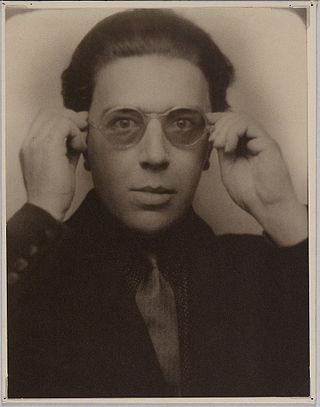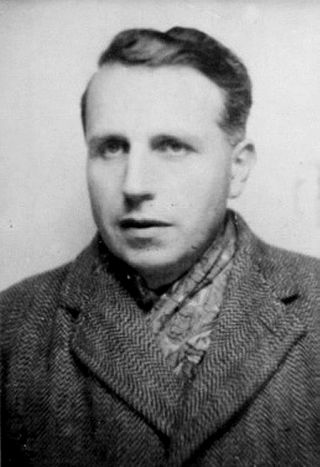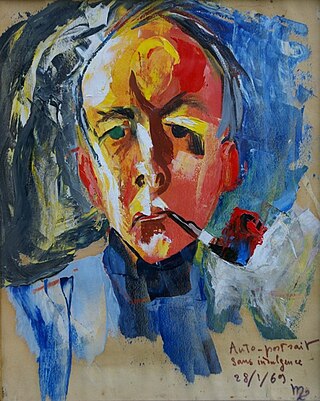Related Research Articles

Sidonie-Gabrielle Colette, known mononymously as Colette, was a French author and woman of letters. She was also a mime, actress, and journalist. Colette is best known in the English-speaking world for her 1944 novella Gigi, which was the basis for the 1958 film and the 1973 stage production of the same name. Her short story collection The Tendrils of the Vine is also famous in France.

André Robert Breton was a French writer and poet, the co-founder, leader, and principal theorist of surrealism. His writings include the first Surrealist Manifesto of 1924, in which he defined surrealism as "pure psychic automatism".
This article contains information about the literary events and publications of 1928.

This article contains information about the literary events and publications of 1873.

Georges Albert Maurice Victor Bataille was a French philosopher and intellectual working in philosophy, literature, sociology, anthropology, and history of art. His writing, which included essays, novels, and poetry, explored such subjects as eroticism, mysticism, surrealism, and transgression. His work would prove influential on subsequent schools of philosophy and social theory, including poststructuralism.

Joseph Kessel, also known as "Jef", was a French journalist and novelist. He was a member of the Académie française and Grand Officer of the Legion of Honour.

Georges Jean Raymond Pompidou was a French politician who served as President of France from 1969 to his death in 1974. He previously served as Prime Minister of France under President Charles de Gaulle from 1962 to 1968, a longevity record under the Fifth Republic.
Marie Trintignant was a French film and stage actress. She appeared in over 30 movies during her 36-year career. Her family was deeply involved in France's film industry, as her father was an actor and her mother was a director, producer, and screenwriter.

Paul François Pierre Bocuse was a French chef based in Lyon known for the high quality of his restaurants and his innovative approaches to cuisine. Dubbed "the pope of gastronomy", he was affectionately nicknamed Monsieur Paul. The Bocuse d'Or, a biennial world chef championship, bears his name.

Francis Jammes was a French and European poet. He spent most of his life in his native region of Béarn and the Basque Country and his poems are known for their lyricism and for singing the pleasures of a humble country life. His later poetry remained lyrical, but also included a strong religious element brought on by his (re)conversion to Catholicism in 1905.

Nadine Trintignant is a French filmmaker and novelist. She is known for making films that surround the topic of family and relationships, such as Ça n'arrive qu'aux autres and L'été prochain. Her film Mon amour, mon amour was nominated for the Palme d'Or at the 1967 Cannes Film Festival.

Guy Joseph Marie de Villardi comte de Montlaur was a French painter from the Languedoc family of Montlaur.

Josette Noële Andrée Claire Dagory, better known as Josette Day, was a French film actress.

La Basoche is an opéra comique in three acts, with music by André Messager and words by Albert Carré. The opera is set in Paris in 1514 and depicts the complications that arise when the elected "king" of the student guild, the Basoche, is mistaken for King Louis XII of France.
Moynat is a Parisian trunkmaker, founded in Paris in 1849 by Octavie and François Coulembier. They collaborated with specialist Pauline Moynat in travel goods to open the company's first store at Avenue de l'Opera, France. The house participated in various World's Fairs.
Colette Sol Rossant was a French-American cookbook author, journalist, translator, and restaurateur, who was a member of the Pallache family.
"Belles de Jour" is the 66th episode of the CW television series Gossip Girl, as well as the season premiere of the show's fourth season. The episode was written by Joshua Safran and Stephanie Savage and directed by Mark Piznarski. It originally aired on Monday, September 13, 2010 on the CW. The episode filmed several scenes in Paris, a move that was heavily promoted by the show's network and commended by critics. A promotional video entitled "Oh Mon Dieu" used a French rendition of Nancy Sinatra's "These Boots Were Made For Walking" to advertise the season premiere.
Serge de Poligny (1903–1983) was a French screenwriter and film director.

Colette Yver was a French Roman Catholic writer from Normandy, the winner of the 1907 Prix Femina for her work Princesses de science.

Hélène Picard, born Hélène Dumarc on October 1, 1873, in Toulouse and died on February 1, 1945, in Paris, was a French poet.
References
- ↑ "La Naissance du jour". AlloCiné (in French). Tiger Global . Retrieved 2012-02-15.
- ↑ Marks, Elaine (1961-11-26). "A Pink Cactus Is About to Bloom". The New York Times . Retrieved 2012-02-15.